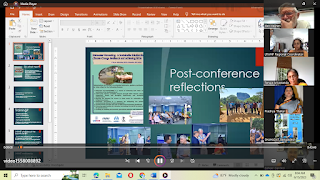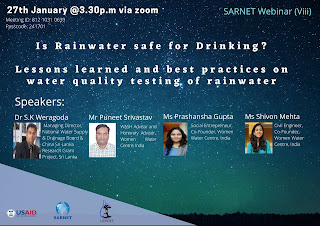The 2nd SARNET conference inspires water sector professionals from South Asia to action
“A Sustainable Solution for Climate Change
Resilience and Achieving SDGs”, the 2-day international conference of SARNET concluded
on the 18th, of May 2023, at the International Water Management Institute
(IWMI) in Colombo, Sri Lanka. This event was organized by SARNET in
collaboration with the Lanka Rain Water Harvesting Forum (LRWHF) and the International
Water Management Institute (IWMI) with the support of USAID.
The program started off with
the technician training program on rainwater harvesting and storage systems.
Participants from Bangladesh, India, Pakistan, Iran, Malawi, Nepal, and Sri
Lanka joined the 04-day program.
The training was delivered
using both classroom-based lectures on the theoretical aspects of rainwater
harvesting and on-site construction of pumpkin-shaped tanks and Calabash
cisterns for storage of rainwater harvesting in Mahiyanganaya in Sri Lanka. Competent masons from Sri Lanka and from
Uganda were kept busy in completing the construction of a Pumpkin shaped and a
Calabash Cistern. The participants received hand on experience in the
construction of pumpkin-shaped tanks and Calabash cisterns for storage of
rainwater harvesting and followed by a field visit to rainwater harvesting beneficiary
sites in schools and households. The participants of this program were given an
opportunity to share their experiences of the training program at the 2nd
international conference of SARNET.
The international conference
spanned over 2 days. The guest speech of Pond man of
India Ramveer Tanwar a living legend who is committed to restoring water bodies
and the keynote speech of Mathew MacCartney Research Group Leader for Sustainable Water
Infrastructure and Ecosystems from IWMI kept the audience
spellbound with their insights at the inauguration. Mr. A.C.M. Nafeel, the
Additional Secretary to the Ministry of Water Supply and State Infrastructure
Development, and Mr. Kevin Dean, Director of the Office of Governance and
Vulnerable Population at USAID Sri Lanka also address the occasion with their thoughts.
Research findings, innovations, best practices, and success stories of 24 presenters from South Asia, Africa and Iran were featured under 3 technical sessions at the conference. The experiences of using rainwater harvesting to provide water demands were featured in technical session 01 “Rainwater Harvesting as a Means of Achieving Safe Water and Sanitation at the Household Level.” Experiences and the feasibility of adopting rainwater harvesting were presented by Sri Lanka, Bangladesh, and India were featured in the session. Experiences from India, Nepal, Pakistan, Bangladesh, and Sri Lanka for meeting the water demand for water for industries, improving and maintaining the aesthetic appearance of gardens, flood control mechanisms, and groundwater recharging were discussed in technical session two. Addressing water scarcity caused due to climate change, lack of safe water available for victims of a disaster, meeting the demands for water for communities in mountainous regions, poverty tied to water availability in regions and the dry zone in Sri Lanka, ground water recharging for saline ingression were among some of the experiences shared during the final technical session 03 on the second day of the event. The interactive discussion provided in the panel discussion provided an opportunity for in-depth conversations on rainwater harvesting and its potential for addressing climate change and achieving sustainable development goals.
Following the conference, the
participants joined for an exposure visit to the ancient rainwater harvesting
sites, and water management systems and to meet the current users. The 3-day
tour included visits to ancient water management systems that harnessed the
potential of rainwater in Anuradhapura including a visit to Wewa (tanks), ponds
such as Kuttam pokuna, 5th Century BC ingenious garden, and
water systems Sigiriya. A meeting with
school children and teachers from a school in Horuwila in Nochchiyagama who are
using a rainwater harvesting system was included in the tour. The tour concluded with a stay in Kandy at the
China Sri Lanka Joint Research and Demonstration Centre in Peradeniya followed
by a discussion on rainwater as safe drinking water, and drinking water status
globally and in South and East Asia.
SARNET at present has over
160 members from 16 countries across the world from South Asia, Africa, Latin
America, East Asia, Netherlands, Switzerland, and Australia. The members are
water sector professionals, activists, researchers, academics, students, and
enthusiasts.






Comments
Post a Comment